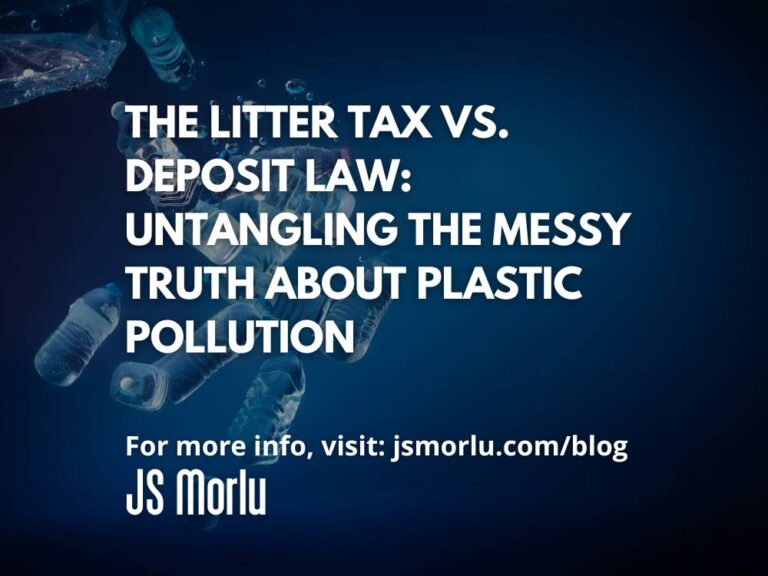For years, litter taxes have been touted as a magic bullet for our persistent plastic pollution woes. But are these hidden fees truly effective, or are they just a messy bandage on a gaping wound? In this article, we dive deep into the world of litter taxes, comparing them head-to-head with the age-old champion: deposit laws. We’ll explore case studies, weigh their strengths and weaknesses, and ultimately ask the question: are litter taxes good policy?
Litter Tax vs. Deposit Law: A Tale of Two Approaches
The battle lines are drawn: on one side, the litter tax, a levy imposed on manufacturers or retailers of certain products, aiming to generate funds for cleanup and education efforts. On the other, the deposit law, a system where consumers pay a small refundable deposit at purchase, only reclaimed upon returning the empty container. The core difference lies in incentives: litter taxes burden everyone, hoping the collected funds will indirectly deter littering, while deposit laws directly reward responsible behavior with a financial perk.
Why Litter Taxes Often Fall Short
While seemingly straightforward, litter taxes struggle with several critical flaws:
- Hidden Disincentive: Buried within product prices, these taxes lack a direct, impactful reminder for consumers to avoid littering. The “polluter pays” principle gets obscured, leaving many unaware of their financial connection to the problem.
- Cumbersome Collection: Unlike deposit laws, where responsibility falls solely on consumers, litter taxes involve a three-way tango between manufacturers, wholesalers, and retailers. This complex chain adds administrative costs and reduces transparency, further distancing consumers from the consequences of littering.
- Misdirected Targeting: Litter taxes often cast a wide net, penalizing responsible citizens alongside the actual offenders. This creates a sense of unfairness and potentially undermines public support for the initiative.
- Costly Bureaucracy: Setting up and administering litter tax programs requires additional government resources, diverting funds from potentially more impactful initiatives like education or direct cleanup efforts.
- Treating the Symptom, Not the Disease: Litter taxes focus on cleaning up existing mess, failing to address the root cause of the problem: excessive waste generation. Deposit laws, by encouraging re-use and recycling, aim to prevent the problem from occurring in the first place.
Litter Tax Case Studies: A Mixed Bag of Results
Examining existing and repealed litter tax programs paints a mixed picture. While success stories like Virginia’s program claim cleaner streets, closer scrutiny reveals questions about their true effectiveness. Meanwhile, states like California abandoned litter taxes altogether, deeming them inefficient and unfair.
Oakland’s Experiment: Can Businesses Clean Up Their Act?
Facing an urban litter crisis, Oakland opted for a business-focused litter tax. Imposing fees based on waste generation, this program aims to hold businesses accountable and fund cleanup efforts. Its long-term success remains to be seen, but it highlights the potential for targeted approaches within specific communities.
Beyond National Boundaries: Global Trends in Litter Control
The fight against plastic pollution is truly global, with litter taxes finding their way into environmental strategies across the world. From Europe to Asia, countries are experimenting with various systems, seeking the most effective solution to this universal challenge.
So, Are Litter Taxes Good Policy? The Verdict is In… (sort of)
Despite the allure of a quick fix, the evidence against litter taxes as a standalone solution is compelling. Their lack of direct incentives, coupled with administrative complexity and questionable effectiveness, casts doubt on their broad application. However, their potential role in targeted situations, like Oakland’s business-focused program, deserves further exploration.
The Way Forward: A Holistic Approach to Plastic Pollution
Ultimately, tackling plastic pollution requires a multi-pronged approach. Deposit laws, with their proven track record of reducing litter and boosting recycling, appear to be a strong foundation. But they shouldn’t be the sole weapon in our arsenal. Effective education programs, responsible product design, and investment in waste management infrastructure are all crucial pieces of the puzzle.
As businesses navigate the intricacies of ever-evolving environmental regulations, staying informed about litter tax policies and actively seeking sustainable solutions becomes paramount. By embracing innovation and collaborating with policymakers and communities, we can truly turn the tide on plastic pollution and pave the way for a cleaner, healthier future.
Remember, the fight against plastic pollution is not a spectator sport. We all have a role to play in reducing our footprint, choosing responsible products, and advocating for effective policies. Let’s work together to untangle this messy problem and create a world where litter becomes a relic of the past.
JS Morlu LLC is a top-tier accounting firm based in Woodbridge, Virginia, with a team of highly experienced and qualified CPAs and business advisors. We are dedicated to providing comprehensive accounting, tax, and business advisory services to clients throughout the Washington, D.C. Metro Area and the surrounding regions. With over a decade of experience, we have cultivated a deep understanding of our clients’ needs and aspirations. We recognize that our clients seek more than just value-added accounting services; they seek a trusted partner who can guide them towards achieving their business goals and personal financial well-being.
Talk to us || What our clients says about us


